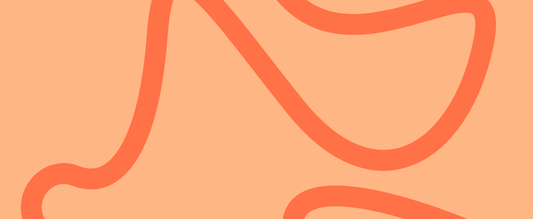The Role of Nutrients in ADHD Management for Women
Read Time 4.5 mins
Attention Deficit Hyperactivity Disorder (ADHD) affects a lot of women worldwide. While it can be tricky to manage, there are various ways to lead a fulfilled life with this unique brain. Therapy and medication are both commonly used interventions. However, we tend to overlook the role of nutrition and food supplements in supporting symptoms.
People with ADHD may benefit from a nutrient-rich diet (the "hungry brain" concept). Therefore, ensuring no deficiency is essential, especially in women who experience hormonal changes.
In this article, I will discuss important nutrients that can help to manage ADHD symptoms. I will also examine how hormonal changes at different life stages impact the nutritional needs of women with ADHD.
The Potential Effects of Nutrient Deficiencies:
We now understand that there may be an association between ADHD symptoms and specific nutrient deficiencies. These can impact the production of some neurotransmitters, brain function, hormone balance, and overall well-being. It is then essential to include these nutrients in the diet; this is especially important for women with ADHD as hormonal changes can add additional challenges.
1-Zinc is an important mineral for proper brain function, neurotransmitter production and hormone balance. Too little zinc in the diet can worsen ADHD symptoms and affect brain function.
2-Magnesium is known to support nerve and muscle function and help with neurotransmitter activity. Low levels of magnesium can lead to trouble focusing, anxiety, and worsening of ADHD symptoms. It also plays a part in hormone production and regulation.
3-Vitamin D functions more like a parathormone. It is involved in neurotransmitter regulation, mood, and cognitive function. It also contributes to thyroid health, essential for hormone balance and metabolism.
4-Omega-3 fatty acids: EPA and DHA are essential for brain health and reducing inflammation. They also impact hormone production in the body.
Getting enough of these nutrients through diet or food supplements is essential for women with ADHD to maintain optimal brain health and manage their symptoms.
Why B Vitamins Matter:
B vitamins help with neurotransmitter formation, nerve function, energy production, and hormonal health. They help support overall health. For instance:
1-Vitamin B6: this vitamin, also called pyridoxine, is involved in neurotransmitter and hormone processing, and some studies suggest a link between vitamin B6 levels and ADHD symptoms.
2-Vitamin B9 and vitamin B12: Also called folate and cobalamin, they are both critical for producing serotonin and dopamine, which regulate focus and mood and can affect hormonal changes.
Methylated forms of B vitamins are often a better choice. Unlike regular B vitamins, methylated B vitamins bypass some processes, making them more accessible for the body to absorb and use.
The right amount of B vitamins can support brain health, hormone balance, and ADHD symptoms.
The Right Balance of Iron:
Iron is vital for many bodily functions, including making and regulating hormones. For women with ADHD, keeping iron levels in check is necessary. Getting enough iron is essential for good health, but having too much iron can also lead to iron overload. It can disrupt the production of neurotransmitters, leading to mood swings and trouble with focus. It can also cause hormone imbalances, low energy, joint pain, and digestive upset.
Regularly checking iron levels and talking to a healthcare professional can help women maintain the right balance and avoid potential side effects.
How to Get Some Key Nutrients:
A nutrient-rich diet is vital for people living with ADHD. Here's where you can find some of these essential nutrients:
1-Zinc: Oysters, meat, pumpkin seeds, cashews, beans, and mushrooms are all excellent sources.
2-Magnesium: Can be found in dark chocolate, nuts, seeds, and spinach.
3-B vitamins: Salmon, eggs, beans, leafy greens, and nutritional yeast, a valuable plant-based source, all contain B vitamins.
4-EPA and DHA fatty acids: Oily fish is a well-known source of EPA and DHA. For vegans and vegetarians, algae-based omega-3 supplements can provide EPA and DHA, as the conversion of ALA from plant sources (e.g. walnuts or flaxseeds) into EPA and DHA is quite limited. However, it's best to consult a healthcare provider before starting omega-3 supplementation, as it can interact with some medications.
5-Vitamin D: mushrooms exposed to sunlight, oily fish, egg yolks, fortified foods, and supplements are all sources of vitamin D. Moderate sun exposure can also help produce vitamin D. I recommend testing for vitamin D, as deficiencies in my practice are prevalent. However, excessive vitamin D intake from supplements can lead to toxicity.
A balanced diet supports overall health, but nutrient deficiencies can still happen due to dietary restrictions, issues with absorption, or increased nutrient demands. In these situations, nutritional supplements can maintain adequate levels and manage ADHD symptoms.
Managing ADHD Through Different Life Stages:
Women experience changes in hormones during their menstrual cycles, pregnancy and postpartum, and the perimenopause period, which is typically during their forties and early fifties. These changes can affect nutrient levels and ADHD symptoms in some women. Ensuring adequate intake of essential nutrients, like B vitamins and minerals, is critical, as it can help support mood and focus.
Nutrient needs increase during pregnancy and after birth to support the mother's and baby's health. The menopause transition can also bring new challenges, as hormonal changes can worsen ADHD symptoms. During post-menopause, nutrient needs typically increase due to factors such as malabsorption, so it is crucial to keep an eye on nutrient intake.
Tailoring nutrition and supplementation to the person's needs can help manage these life stages. Talking to a healthcare professional for personalised advice can help support nutrient intake and ADHD symptoms during these transitional periods.
Feeding the 'hungry brain' with essential nutrients is important for women navigating ADHD during various life stages marked by hormonal changes. Women can manage their symptoms and support their long-term health by focusing on a diverse, nutrient-rich diet and taking targeted supplements.
About the author:
Karine Stephan is a Registered Nutritional Therapy Practitioner (MBANT), specialising in women's health, hormones, and ADHD. She also has personal experience living with ADHD.
If you'd like to chat about your specific needs, feel free to reach out to Karine for a complimentary call at Happy Living Nutrition. You can also follow her on Instagram here.

Gut Health and ADHD – Building a Healthy Connection
Read time 4 mins

ADHD and Eating - Understanding Food Challenges
Read time 5 mins

Sugar & ADHD - Debunking the Myth
Read time 5 mins







